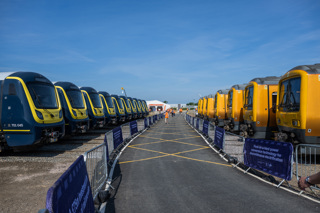As with any explosion, the nuclear detonation of the Brexit Bang first destroyed those closest, before inflicting devastation on those progressively further away from the epicentre.
Thus, David Cameron’s Conservative premiership was vaporised in the initial blinding flash, while over at Labour Jeremy Corbyn’s distance from the argument (in every sense, according to his MPs) meant his leadership was merely crippled. His Shadow Cabinet imploded, leaving a defiant Corbyn to carry on with a jaw-dropping selection of inexperienced unknowns in frontbench roles, following an unprecedented 46 ministerial/aide resignations in the days after the Brexit Bang.
The severity of the explosion is shown by this stark fact: it was, experts say, the first time in British parliamentary history that both principal parties were leaderless - notwithstanding that Corbyn clung on despite 170 of his MPs (around 80%) supporting a ‘no confidence’ motion.
The waves of high energy destruction unleashed by the Brexit Bang are now rippling out from Westminster and they will destroy, transform or change everything in their path. And make no mistake, they will eventually reach the railway. So what can we expect?
As with every area of British life and commerce, we simply do not know. Our railway’s relationship with Europe is extensive, intertwined and complex. Let’s deal with misconceptions first. The idea that ‘Johnny Foreigner’ from Brussels is constantly inflicting his will on us in rail terms is wide of the mark. Talk to those who know and they all tell the same story: that our railway is Europe’s most liberalised and the safest, and that if anything it is the UK that has driven EU rail policy and technology, not the other way round!
“The UK rail industry has been very active in EU rail negotiations and policy setting,” says Jim Steer, founder of now-global rail consultancy Steer Davies Gleave. “Rail is a sector where the UK leads in Europe in so many respects and our opinions and approaches are admired and welcomed. Indeed, UK positions and regulatory experience have often been the starting point for EU proposals.
“However, the Government has rarely mentioned this very positive side of EU participation. The EU story on rail is very different to the national debate between our politicians. Perhaps they should be told.”
Where EU issues have caused problems, it has often been our own fault. As former ATOC European Policy Manager Richard Wallace pointed out in RAIL 802, we cannot buy more Class 66 freight locomotives because of the Non Road Mobile Machinery Directive and its associated restrictive emissions rules. Richard points out that we paid scant attention at the time of its drafting 20 years ago and simply did not argue our position. So it was our failure, not the EU’s.
Likewise with the Thameslink fleet controversy of 2011, which Bombardier lost to Siemens amid much vitriol about the EU. We could - like the French routinely do with Alstom - have given Bombardier an advantage had we argued the case within the rules at an early stage of specification. But we didn’t, and so when the story erupted it was too late.
Transport for London learned the lesson, and when EU standards implied that the Crossrail tunnels should be of hideously expensive bigger European loading gauge, then-Commissioner Peter Hendy argued that the unlikelihood of German freight trains rumbling through Tottenham Court Road station demanded a derogation. He got it.
Now, all rail matters will proceed without our voice - and yet we will still have to live with the outcomes having had no say in their development. This will especially affect Eurotunnel, Eurostar and freight operators. Worse, our resurgent supply industry will have to work with whatever the EU wants, if they wish to work in (and export to) Europe.
Jim Steer: “The price of exit will be painful.”
What about the rail projects that would have been supported by the European Investment Bank? Now we have “taken back control” will the Treasury simply write a cheque? This is a much wider problem, incidentally. Wales has been a net financial beneficiary of EU funds, and already MPs are proclaiming that if the Brexit campaign’s promise to maintain that funding is broken it will be a betrayal. British farmers are likewise calling for the Treasury to guarantee their £3 billion annual EU subsidies which will now evaporate. And all this is in addition to the wider demand that the UK’s entire £350 million weekly EU contribution should be immediately given (as promised by Brexit) to the NHS. Big trouble lies ahead.
Legislatively, there’s a horrific mountain to climb. Here’s what expert Professor Dieter Helm had to say: “Parliament will have to start a marathon legislative programme. It will need to reconstruct policies on agriculture, fisheries, telecoms, state aid, renewables, and almost all environmental policy - and it will need new financial legislation.”
All of this is unplanned and in addition to a programme that already fills the parliamentary schedule. It’s made worse by the fact that no one on the leave side has any kind of a plan. It’s a complete mess. As one Twitter poster remarked: “Even Baldrick had a ******* plan.”
The likelihood is that in the face of this tsunami of required new legislation, Parliament may choose in desperation simply to accept the existing European legislation. Really? What was that about taking control?!
You could argue that in all this chaos, the railway will be ‘safe’ because it won’t be seen as a priority. But there is a looming related major risk arising out of that dangerous principle - the law of unintended consequence.
For the past few years, our very significant rail investment programme has been secured by the solid support of Chancellor George Osborne. HS2 and the Northern Powerhouse, the enhanced new Northern franchise, electrification, new trains, even the unspecified HS3 have all had his backing and protection. He was, however, badly damaged in the referendum campaign by his so-called threatened ‘punishment budget‘ and he has already renounced all hopes of leading his party. If Osborne goes, his consistent, solid rail investment support will probably evaporate - certainly if Boris Johnson is PM.
Yes, Government and rail industry should strive to maintain investment, exude confidence, do the best job we can and follow Churchill’s advice: keep calm and carry on. But the Brexit Big Bang has changed everything - changed it utterly. We have no idea what sort of rail future will be born as a result of the negotiations, changes and new relationship with Europe which will now follow, amid the kind of toxic uncertainty that investors loathe and need no encouragement to avoid - by placing their capital elsewhere.
I know the rail industry is up for the challenge - and it will need to be. Buckle up.
Comment: RAIL 804: July 6 2016 - July 19 2016


















Login to comment
Comments
No comments have been made yet.